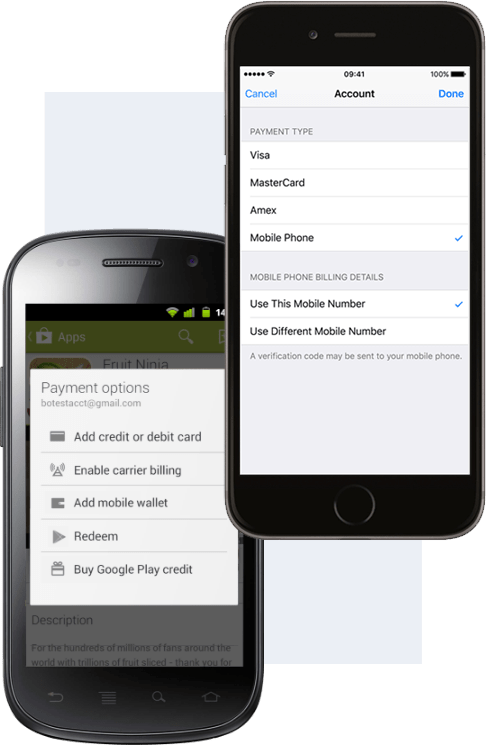Boku Inc (LON:BOKU), the world’s leading independent carrier commerce company, is pleased to announce its audited results for the year ended 31 December 2020.
Group Financial Highlights
· Adjusted EBITDA* increased 107% to $15.3 million (2019: $7.4 million)
· Group revenues increased 20% to $56.4 million (2019: $46.8 million**)
· Net loss before tax of $17.3 million (2019: $1.3 million loss) primarily due to the goodwill impairment for Identity division of $20.8 million. This total includes a net Profit before tax from the Payments Division of $9.2 million
· Cash generated from Operations before working capital changes during the year was $11.5 million (2019: $6.1 million)
· Closing cash balances increased to $62.7 million at 31 December 2020 up from $35.6 million at 31 December 2019
Boku Payments Division
· Acquisition of carrier billing company Fortumo Holdings Inc. for a maximum enterprise value of $41.0 million completed on 1 July 2020
· Payments division revenue of $51.2 million, an increase of 27% on 2019’s underlying figure of $40.2 million**
· Payments division Adjusted EBITDA of $19.2 million (2019: $12.7 million) including $1.5 million from Fortumo
· Monthly Active Users (MAU) up 48% to 28.8m (2019: 17.8m) includes 4.6m MAUs from Fortumo
· Total Payment Volume (TPV) of $6.9 billion in 2020 compared to $5.0 billion in 2019
· eWallet transactions processed from 13 accounts across 11 wallets in 7 countries in 2020. Further investment in 2021 to capture the significant eWallet opportunity
Boku Identity Division
· Identity revenue of $5.2 million (2019: $6.7 million) – impacted by COVID-19 and local US supply headwinds resulting in carrying value of asset reappraised
· Identity reduced Adjusted EBITDA loss of $3.9 million (2019: $5.3 million EBITDA loss)
· Identity carrier network expanded and now reaching more than 200 carriers in 60 countries
· Contract wins include GDC, LexisNexis and FIS (owners of Worldpay)
*Adjusted EBITDA: Earnings before interest, tax, depreciation and amortisation, impairment of goodwill, non-recurring payment revenue, stock option expenses, forex gains/losses and exceptional items
** 2019 comparative revenue excludes $3.3m of non-recurring payments revenue to better reflect underlying performance
*** TPV is the $ value of transactions processed by the Boku and Fortumo platforms
Jon Prideaux, Chief Executive of Boku Inc, commented, “Boku performed strongly in 2020 with revenues up and Adjusted EBITDA more than doubled compared to 2019, driven by the performance of Boku Payments but the central fact of 2020 was COVID-19.
“It has changed the way that we work and live and had an adverse impact on our Identity business, requiring its value to be re-assessed. Restrictions have affected the way that we travel, communicate and get entertained. Coronavirus has depressed spending, but that spikey ball of RNA has also changed the things we buy and the way we pay.
“Industries dependent on face-to-face contact have been decimated. Some – hospitality, for example – will bounce back when restrictions are released, but for others, the pandemic has accelerated pre-existing trends. It turns out that many people didn’t really like driving into town to go shopping and for many types of goods the switch to online will be permanent.
“The way we entertain ourselves has been changing for a while. CDs have been cleared from the shelves and DVDs sent to the car boot sale, as we switch to digital consumption. Games, especially mobile games, were already growing rapidly pre-COVID-19.
“The COVID-19 related lockdowns have accelerated these trends and Boku’s customers have benefited, but since the transition was already well developed, what we’ve seen is a boost, not a transformation of our business. Boku has long benefited from the tailwinds of mobile adoption and digital disruption and 2020 was no different.
“Boku can look to 2021 and beyond with a great deal of confidence. Boku Identity looks poised to grow as new customers are connected with unrivalled levels of supply. For our Payments division, we expect to cross sell wallets into more of our existing customers. With each launch, revenue will start to build, more materially in 2022. We will invest in our platform so as to be in a position to capture non digital revenues. All this is underpinned by a DCB business which is poised to continue its multi-year record of strong growth with exceptional operational gearing.
“We have made a flying start to 2021, with trading in line with our aggressive plans and I am confident in our ability to meet expectations.”
CHAIRMAN’S STATEMENT
For many organisations 2020 was a challenging year. Externally events were dominated by a global pandemic, but Boku was able to execute on its plan. At a Group level, revenues exceeded $56 million and Adjusted EBITDA* more than doubled to $15.3 million, up from last year’s figures of $46.8 million** and $7.4 million respectively. The heart of our business is the Boku platform. This year we processed record numbers of transactions – peaking at more than 400 each second. The platform connects more than 220 mobile wallets and network operators for both payment and identity services to Boku’s customers, including many of the world’s largest companies.
The core Direct Carrier Billing (“DCB”) business performed strongly during the year. As more people stayed at home during the pandemic, demand for home entertainment increased and Boku benefited, pushing up the value processed through the system in 2020 to just under $7 billion, 38% up on 2019. New users recruited in 2020 reached a new record as well at 25.9 million across our payments and bundling programmes. Adjusted EBITDA for the Payments division increased to over $19.2 million.
In 2020, Boku acquired Fortumo, the second most profitable DCB company behind Boku, which sells on a global scale. The transaction was well received by the market and has performed in line with expectations, contributing $4.5 million of revenue and $1.5 million of Adjusted EBITDA in the six months to 31st December, from which their figures were consolidated.
Boku Identity was not able to deliver the level of progress we had previously expected but despite negative impacts from the pandemic and supply issues in the US, was able to make some progress at a profitability level with Adjusted EBITDA losses reduced to $3.9 million.
We were pleased to welcome Charlotta Ginman to the Board as a Non-Executive Director during the year. She is an experienced Non-Executive Director, with executive experience at Nokia. She is already contributing to the Board and has joined the Audit and Remuneration Committees, allowing me to step back, in line with best corporate governance practices. I also wish to thank the other Non-Executive Directors, Stewart Roberts, who chairs the Audit Committee and Richard Hargreaves who chairs the Remuneration committee, for their service on the Board and contribution to the Company during the year.
In 2021, a key focus of the Company’s management is to operationalise and scale our mobile wallet business. We have made a promising start with some big wins with important customers. Boku is well positioned to leverage these early successes as we build Boku into a mainstream, fintech payment platform specialising in next-generation payments.
Mark Britto
Non-Executive Chairman
15 March 2021
*Adjusted EBITDA: Earnings before interest, tax, depreciation and amortisation, impairment of goodwill, non-recurring payment revenue, stock option expenses, forex gains/losses and exceptional items. See Consolidated Statement of Comprehensive Income.
** 2019 comparative revenue excludes $3.3m of non-recurring payments revenue to better reflect underlying performance
CHIEF EXECUTIVE OFFICER’S REPORT
Group Performance
Boku performed strongly in 2020 with revenues up to $56.4 million and Adjusted EBITDA more than doubled compared to 2019, driven by the performance of Boku payments but the central fact of 2020 was COVID-19. It has changed the way that we work and live and had an adverse impact on our Identity business, requiring its value to be re-assessed. Restrictions have affected the way that we travel, communicate and get entertained. Coronavirus has depressed spending, but that spikey ball of RNA has also changed the things we buy and the way we pay.
Industries dependent on face-to-face contact have been decimated. Some – hospitality, for example – will bounce back when restrictions are released, but for others, the pandemic has accelerated pre-existing trends. It turns out that many people didn’t really like driving into town to go shopping and for many types of goods the switch to online will be permanent.
The way we entertain ourselves has been changing for a while. CDs have been cleared from the shelves and DVDs sent to the car boot sale, as we switch to digital consumption. Games, especially mobile games, were already growing rapidly pre-COVID-19. The lockdowns have accelerated these trends and Boku’s customers have benefited, but since the transition was already well developed, what we’ve seen is a boost, not a transformation of our business. Boku has long benefited from the tailwinds of mobile adoption and digital disruption and 2020 was no different.
Strong Organic Performance in Payments
In 2020, we have been able to help our customers acquire more than 25.9 million new users across payment and bundling programmes; more payment users are repeat users too, with that figure hitting a high of 91% averaged throughout the year. Value processed through our system increased to $6.9 billion, a 38.3% increase since last year. We exited the year on a run rate which exceeded $8.5 billion. Truly the lines on the charts are going up and to the right!
Our growth did not just come from existing connections in in a particular geography – new launches have been made for Apple, Sony, Spotify, Netflix, Tencent, Microsoft, Google and many other smaller merchants.
Boku takes a percentage of the value processed through its systems as revenue. We charge different prices depending on whether we provide a technical connection only or additionally handle the settlement of the funds. Over recent years the lower priced technical service has been growing faster than the higher priced settlement service, leading to lower reported take rates, despite stable pricing. This year, those trends stabilised as more settlement model business was processed through connections developed in prior years.
Acquisition of Fortumo
Scale is important in platform businesses. By being the largest, Boku is able to offer the most robust and feature-rich platform at the lowest unit cost in the industry. Most of our growth has been organic: quality inorganic opportunities are few and far between. In July 2020, we were delighted to acquire Fortumo, the second most profitable company in the DCB business, behind Boku. The enterprise value associated with the acquisition was a maximum of $41 million, with $5.4 million being dependent on the achievement of a demanding Adjusted EBITDA target in the 12 months ending June 2021. Since acquisition, the business has performed in line with our expectations, which will mean that the full earnout is unlikely to be payable.
Fortumo has brought impressive new capabilities into the Group: customer relationships with Amazon, Epic Games and more than 400 other, mostly settlement model, merchants, a platform with semi-automated onboarding capabilities, new carrier connections, especially in some emerging markets, and the best bundling platform in the market. Going forward we will concentrate new DCB and bundling investment in Fortumo’s EU platform, whilst the original Boku US platform will focus on strategic merchants and new local payment methods, including wallets.
Strong Financial Performance in Payments
Taking Boku and Fortumo revenues together, revenue from the Payments division grew to $51.2 million up 27% from 2019’s figure of $40.2 million*. Fortumo contributed $4.5 million, in line with expectations. Adjusted EBITDA leverage in the payments business is impressive with payments Adjusted EBITDA up 54% to $19.2 million (including $1.5 million contribution from Fortumo).
Progress on Identity
Boku Identity was able to post a narrower adjusted EBITDA loss of $3.9 million. Revenues at $5.2 million was lower than the previous year due to carrier supply issues and the impact of COVID-19. The business is still poised to grow but from a lower base and at a lower rate, meaning that the path to break even is longer than previously thought, resulting in an impairment to the carrying value of goodwill of $20.8 million.
Turning to non financial measures, the global carrier network now reaches more than 200 carriers in 60 countries. Contracts have been signed with customers like GDC, LexisNexis and FIS. The focus for 2021 is to connect these merchants to international markets and thus increase revenues.
Promise of Wallets
For Boku, DCB is the starter, the main course is local payments. We’re using the connections that we have to all the world’s leading digital merchants as a beachhead from which we can cross sell other payment methods. The first of these is mobile wallets. They are the payment phenomenon of the last five years. Popular with consumers, in demand from merchants.
Just like DCB, mobile wallets are highly fragmented, with multiple wallets in individual countries, battling for consumers, just like mobile operators. For our merchants, Boku has harmonised this complex, global infrastructure into a single payments network. The market is in need of a similar approach for mobile wallets; the value that Boku can deliver to merchants through a single mobile payments network is immense.
In 2020 we processed transactions from 13 accounts across 11 wallets in 7 countries. Pleasingly amongst these were major merchants in console games and streaming music. These accounts were won in competition with mainstream cards-first payment processors. We expect to be able to announce further progress during 2021. The significance is two-fold: firstly, with wallets we can process a larger share of our customers sales and, secondly, go outside digital and serve the general ecommerce market which is 20 times as big. That is the main course.
Actual experience has also been encouraging: volume growth has been material, albeit off a small base. Where wallets and DCB are connected to the same merchant in the same country we can see faster adoption, higher average transaction values and more users.
Helping Out Others during the Pandemic
At Boku we recognise that with our good fortune, comes responsibility. We have tried to do our bit to help those less fortunate than ourselves. We have claimed no Government money in any of the countries in which we operate (and have returned it in one instance where it was automatically credited to us), and we have continued to employ our office support staff and contractors despite offices being closed. Now is the time to support the support workers. We have used some of the savings that we have made from reduced travel on a “We Not Me” programme of donations to local causes nominated by employees.
Companies are not just collections of assets and intellectual property; technology companies like Boku are groups of people working towards a common aim, with belief and conviction. Without our people, without the right people, we are nothing. We are careful when we hire and we ensure that all, every single one of our employees wheresoever located and however senior or junior, gets the chance to be a shareholder in our company.
Through the crisis, our employees have repaid that trust in spades. They have been magnificent. The flexible working practices that we had in place before restrictions hit meant that we could adapt rapidly and continue to deliver for our customers. In 2020, we’ve been able to deliver a record number of new high quality connections: (69 vs. 42 in 2019). I want to place on record my sincere appreciation for the exceptional contribution that our people have made to our results.
Outlook
Boku can look into 2021 with a great deal of confidence. Boku Identity looks poised to grow as new customers are connected with unrivalled levels of supply. For our Payments division, we expect to cross sell wallets into more of our existing customers. With each launch, revenue will start to build, more materially in 2022. We will invest in our platform so as to be in a position to capture non digital revenues. We expect to board our first wallet-only, non-DCB payments customers in 2021. This will be an important signal of our ability to gain traction in this important segment. All this is underpinned by a DCB business which is poised to continue its multi-year record of strong growth with exceptional operational gearing. We have made a flying start to 2021, with trading in line with our aggressive plans — I am confident in our ability to meet expectations.
Jon Prideaux
Chief Executive Officer
15 March 2021
* Adjusted for the impact of $3.3 million of non-recurring revenue









































